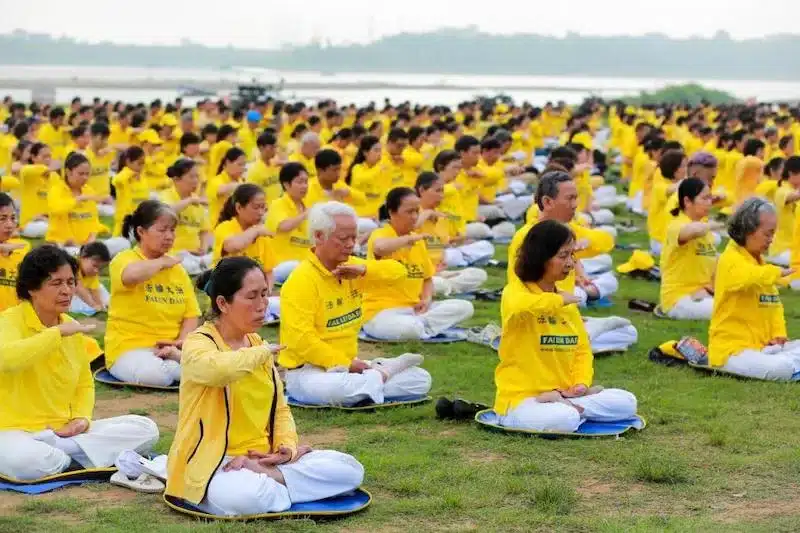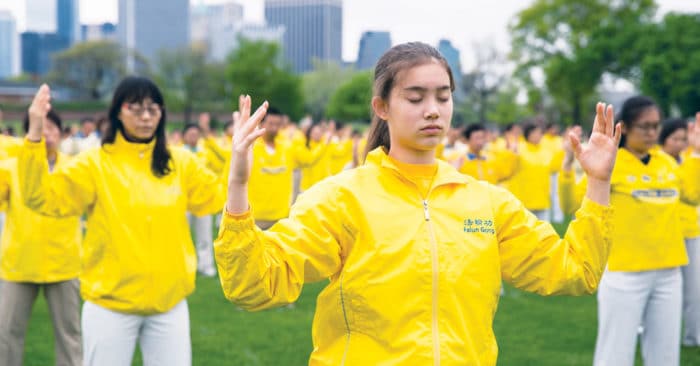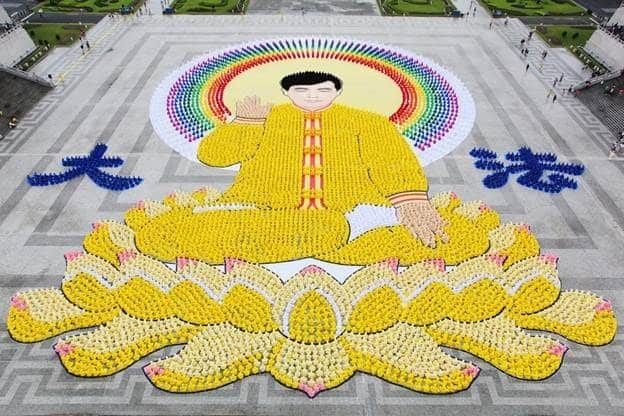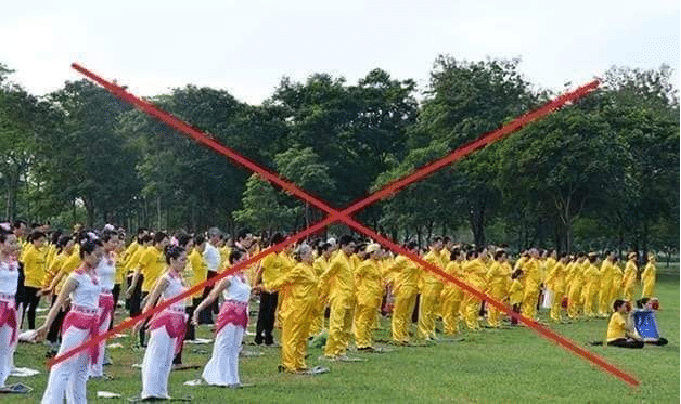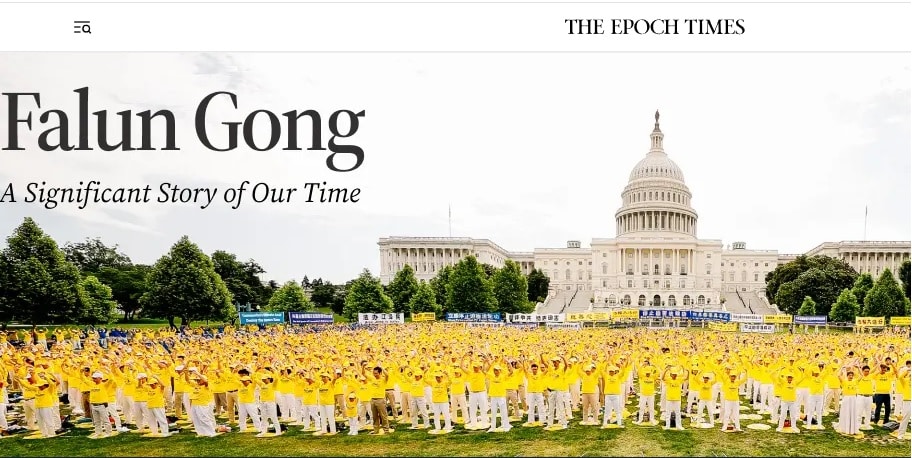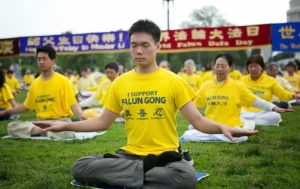Introduced to the public in China in 1992 by its founder, Li Hongzhi, Falun Gong quickly became popular due to its profound effects on physical health, mental health, and spiritual growth.
However, its rapid expansion and the ideological challenge it posed to the Chinese Communist Party led to a severe crackdown on the practice in 1999, marking the beginning of the a complex and often misunderstood story of perseverance in the face of persecution.
What is Falun Gong?
Falun Gong, also known as Falun Dafa, is a spiritual practice that combines meditation and qigong exercises with a moral philosophy focusing on the principles of Truthfulness, Compassion, and Forbearance.
Emerging from China’s qigong boom in the early 1990s, it was introduced to the public by its founder, Li Hongzhi, in 1992. Falun Gong is different from other qigong practices because it not only emphasizes physical health but also mental improvement, aiming to cultivate one’s personality according to universal principles.
This practice consists of five sets of exercises, including four standing exercises and one sitting meditation, which are said to enhance physical and mental health by harnessing the energy in the body and regulating oneself. according to the principles of the universe. Falun Gong practitioners aspire to achieve a state of spiritual enlightenment or “perfection” through these exercises and adhere to the core values of the practice.
In its early years, Falun Gong was widely popular in China, with an estimated tens of millions of practitioners by the late 1990s. However, its growth led to tensions with the Chinese government. , which saw the movement’s large following and moral teachings as a potential threat to its power. In 1999, the Chinese government launched a comprehensive crackdown on Falun Gong, declaring the practice a “heretical organization” and launching a propaganda campaign, jailing and accusations of abuse. Human rights violations against practitioners.
The persecution has been the subject of international controversy and criticism, with human rights organizations condemning the treatment of Falun Gong practitioners in China. Since then, the movement has spread internationally, with practitioners continuing to work overseas, campaigning for human rights in China and raising awareness of the persecution they face.
Mr. Trong Duy Quang, a Chinese scholar living in Germany, has studied Falun Dafa for many years. He said: “Truthfulness, Compassion, Forbearance are the core values that Falun Gong practitioners follow. It’s not just a slogan. Their activities are always voluntary. They use their own money as part of every activity they participate in. I’ve seen my friends change; they become purer, gentler, and more altruistic. Truthfulness, Compassion, Forbearance are the essence of life, the real life of the practitioners.
Practitioners do not engage in politics or struggle for personal gain. Thus, they are not influenced by politics or money. This is the strength of faith and spirit. Practitioners must speak and live truthfully. That is their true nature. Compassion and Forbearance are completely opposed to violence. The existence of Compassion and Forbearance dissolves lies and slander. It helps to elevate human morality back to traditional cultural values. It contributes to the prosperity of society as a whole.”
Practitioners do not engage in politics or struggle for personal gain. Thus, they are not influenced by politics or money. This is the strength of faith and spirit. Practitioners must speak and live truthfully. That is their true nature. Compassion and Forbearance are completely opposed to violence. The existence of Compassion and Forbearance dissolves lies and slander. It helps to elevate human morality back to traditional cultural values. It contributes to the prosperity of society as a whole.”
The teachings of Falun Gong are presented in detail in a number of texts composed by Li Hongzhi, of which “Zhuan Falun” is the most comprehensive work. These articles cover a variety of topics, from practical principles to scientific and spiritual discussions. Despite the controversy surrounding its status in China, Falun Gong remains present in various countries around the world, where it is practiced freely and continues to attract many interested followers. interested in its spiritual teachings and health benefits.
Benefits of Practicing Falun Gong
Practicing Falun Gong brings many benefits including physical, mental and spiritual health. The practice includes meditation and qigong exercises, designed to improve health and foster peace of mind, alongside an ethical philosophy that encourages practitioners to live in harmony within society and the universe.
Physical Health Improvements
One of the most immediate benefits reported by Falun Gong practitioners is increased physical health. The gentle and meditative exercises of this practice are known to reduce stress, improve cardiovascular function and enhance the body’s immune response.
Many practitioners have reported significant improvements in chronic conditions, increased energy levels, and a general feeling of physical health. These health benefits are due to the practice’s emphasis on harmony between body and mind as well as the effective circulation of qi, or vital energy, throughout the body.
Mental and Emotional Well-being
Falun Gong’s emphasis on meditation and mindfulness contributes significantly to mental and emotional health. Practitioners often reduce their levels of anxiety, depression, and stress through regular practice. A focus on Truthfulness, Compassion and Forbearance fosters a positive outlook on life, enhancing a person’s ability to deal with challenges and setbacks calmly and constructively. This mental resilience is vital in today’s fast-paced and often stressful world.
Spiritual Growth
In addition to its physical and mental benefits, Falun Gong also offers opportunities for profound spiritual growth. This practice encourages self-reflection and living a life consistent with its core principles. Many practitioners find a deeper sense of purpose and fulfillment in their lives, as well as a stronger connection to the world around them. This spiritual enrichment is seen not only as a personal achievement but also as a way to make a positive contribution to society.
Moral Upliftment and Social Harmony
The principles of Truthfulness, Compassion, and Forbearance have a ripple effect beyond the individual, fostering ethical behavior, integrity, and a sense of responsibility towards others. Practitioners often become more altruistic and community-oriented, contributing to a more cohesive and harmonious society. This moral upliftment is particularly relevant in addressing contemporary social and ethical challenges, promoting values of kindness, tolerance, and understanding.
Cultural and Educational Enrichment
Falun Gong also provides cultural and educational richness through its connection to traditional Chinese philosophy, medicine, and qigong. Students gain insight into aspects of Chinese culture that are often overlooked in the modern world, including the importance of harmony between humans and nature as well as the value of cultivating spiritual practice.
The Five Exercises of Falun Dafa
The five exercises of Falun Dafa are a series of gentle meditative movements designed to harness energy (qi) and promote mental enlightenment and physical health.
Rooted in traditional Chinese medicine and qigong, these exercises complement the practice’s core principles of Truthfulness, Compassion, and Forbearance. Each exercise serves a specific purpose in assisting the practitioner to cultivate the body, mind and spirit. Here is an overview of these exercises:
1. Buddha Showing a Thousand Hands (Fo Zhan Qian Shou Fa)
The first exercise is aimed at stretching and opening the body’s energy channels. Practitioners perform a series of gentle hand gestures and movements that are believed to facilitate the free flow of qi throughout the body. This exercise sets the foundation for achieving a state of harmony between the body and the universe.
2. The Falun Standing Stance (Falun Zhuang Fa)
This is a standing meditation that involves holding four static poses for an extended period. Each pose is maintained until the practitioner experiences a certain level of discomfort. This exercise is designed to increase physical strength, endurance, and tranquility, as well as to further open the energy channels and strengthen divine powers.
3. Penetrating the Two Cosmic Extremes (Cosmos Penetrating)
In this exercise, practitioners move their hands up and down in front of the body in large arcs. The movement is thought to mix and circulate the energy throughout the universe and the practitioner’s body, facilitating the exchange of bad qi with good qi from the cosmos, thereby purifying the body.
4. Falun Cosmic Orbit (Falun Zhoutian Fa)
This exercise aims to circulate energy extensively throughout the body, opening up the meridians and unblocking energy channels. Practitioners move their hands around the body in a series of movements that guide qi through the four main meridians, achieving a greater balance of energy and promoting health and vitality.
5. Strengthening Divine Powers (Shen Tong Zhi Fa)
The fifth and final exercise is a meditation that involves sitting with both legs crossed (in the full lotus position if possible). This exercise focuses on tranquility, achieving a state of stillness, and strengthening one’s divine powers through meditation. It aids in the cultivation of energy, endurance, and spiritual elevation.
Is Falun Gong Good or Bad?
Determining whether Falun Gong is “good” or “bad” depends greatly on each person’s perspective. For practitioners and many individuals who value religious freedom and human rights, Falun Gong represents a beneficial spiritual practice that enhances human life and happiness. From the Chinese government’s perspective, this is seen as a source of dissent that needs to be controlled.
For an objective observer, it may be more appropriate to consider the multifaceted nature of Falun Gong: as a spiritual practice, it brings significant benefits to its adherents, promote personal development and community well-being. However, its existence in a particular political context has led to significant conflict and suffering, highlighting the challenges faced by spiritual movements in authoritarian regimes.
Is Falun Gong a Religion?
Understanding whether Falun Gong is a religion requires understanding its characteristics, practices, and teaching purposes.
Spiritual but Not Institutional
Falun Gong shares many elements with traditional religious practices, such as an ethical framework, spiritual teachings, and an emphasis on moral conduct and personal improvement. It speaks of higher realms, the nature of the universe, and the pursuit of spiritual enlightenment, themes commonly found in religions. However, Falun Gong differs from conventional religions in several key aspects:
- Lack of Formal Worship: Falun Gong does not involve the worship of deities or a creator god. While it teaches about higher beings, the focus is on personal cultivation and self-improvement according to its principles.
- No Formal Institutions: Unlike traditional religions, which often have hierarchical structures, churches, temples, or mosques, Falun Gong operates without a formal institutional framework. It does not have clergy, rituals, or religious ceremonies.
- Self-Cultivation and Practice: The essence of Falun Gong lies in individual practice through meditation, exercises, and living according to its core principles. This self-directed approach is more akin to a spiritual discipline than a religion with communal rites.
Cultural and Legal Contexts
The perception of Falun Gong as a religion or a spiritual practice also depends on the cultural and legal context. In the West, where religious freedom is a fundamental right, Falun Gong is often classified as a “new religious movement.” This classification acknowledges its spiritual aspects without necessarily implying the structure or dogmas of established religions.
In China, the classification of Falun Gong has legal and political implications. The Chinese government’s designation of Falun Gong as a “heretical organization” in 1999 and subsequent persecution stemmed in part from the threat they perceived from the practice’s popularity and potential. the social mobilization of this practice, rather than its religious nature.
Why is Falun Gong Persecuted in China?
The persecution of Falun Gong in China, which began in 1999, is a complex problem rooted in the movement’s rapid development, its ideological and organizational characteristics, and the government’s response. China faces threats to its power and social stability.
To understand why Falun Gong faces such severe persecution, it is important to consider some of the key factors that have contributed to the current situation.
Rapid Expansion and Popularity
Falun Gong, introduced to the public by Li Hongzhi in 1992, quickly grew in popularity across China. By the late 1990s, it was estimated to have tens of millions of practitioners. This rapid expansion, and the large gatherings of Falun Gong practitioners, alarmed Chinese authorities. The government, which maintains strict control over social and religious organizations, viewed the size and organizational capability of Falun Gong as a potential challenge to its power.
Ideological Differences
Falun Gong’s teachings emphasize moral principles such as Truthfulness, Compassion, and Forbearance, and promote spiritual enlightenment and physical health through meditation and qigong exercises.
Although these teachings were not inherently political, their emphasis on moral and spiritual independence, as well as their implicit critique of materialism and moral decline, were rejected by the Communist Party. China (CCP) considers its atheistic and materialist ideology ideologically incompatible. The movement’s ability to mobilize and organize large numbers of people beyond the party’s control underscores this perceived threat.
1999 Zhongnanhai Protest
A pivotal event in the relationship between Falun Gong and the Chinese government was the peaceful protest of April 25, 1999, when over 10,000 Falun Gong practitioners gathered near the Zhongnanhai government compound in Beijing.
They were protesting the arrest of practitioners in Tianjin and seeking legal recognition and freedom from state interference in their practice. While the protest was peaceful and orderly, the size and discipline of the gathering demonstrated Falun Gong’s organizational capabilities and deeply unnerved the Chinese leadership.
Government Crackdown
In response, the Chinese government launched a comprehensive crackdown on Falun Gong on July 20, 1999, declaring it a “heretical organization” and initiating a campaign of suppression that included propaganda, imprisonment, and allegations of human rights abuses such as torture and extrajudicial killings. The government’s actions were framed as necessary to maintain social stability and the security of the state.
International Human Rights Concerns
The persecution of Falun Gong has attracted significant international criticism. Human rights organizations have documented widespread abuses, and the international community has called on China to respect freedom of belief and end the repression of Falun Gong practitioners.
However, in China, the government has sought to justify its actions by portraying Falun Gong as a threat to society, often using state-controlled media to spread negative descriptions of this practice.
The Relationship between Falun Gong and The Epoch Times
The Epoch Times is a global multilingual newspaper founded in 2000 by John Tang and a group of Chinese Americans involved with the Falun Gong spiritual movement.
The newspaper was originally founded with the aim of providing news about China that was not affected by the Chinese government’s censorship policies. Over time, The Epoch Times has expanded its focus to cover topics of general interest, including politics, culture, health, and science, among others. However, its origins and connection to Falun Gong continue to shape its editorial stance, particularly in relation to China and human rights issues.
Origins and Intentions
The founding of The Epoch Times may have originated from Falun Gong practitioners’ desire to create a media platform that could present a different perspective on China, different from the stories told by the media. promoted by state-controlled media.
This was in response to the Chinese government’s persecution of Falun Gong that began in 1999, which saw a widespread campaign of repression, including censorship, propaganda and accusations of human rights abuses against practitioners. pellets. The newspaper sought to report on these issues, aiming to raise awareness of the persecution of Falun Gong and other human rights issues in China.
Editorial Focus and Coverage
The Epoch Times has been known for its critical stance towards the Chinese Communist Party (CCP) and its coverage of human rights abuses in China, including the persecution of Falun Gong practitioners, Tibetans, Uighurs, and other minority groups.
It also features content related to Chinese culture, traditional values, and spirituality, reflecting the philosophical and ethical underpinnings of Falun Gong. While The Epoch Times covers a broad range of topics beyond China, its origins and connection to the Falun Gong movement continue to influence its editorial choices, especially regarding issues related to freedom of belief, human rights, and the CCP’s policies.
Public Perception and Controversy
The relationship between The Epoch Times and Falun Gong has been the subject of scrutiny and controversy. Critics have pointed out this connection to question the newspaper’s objectivity and argue that it is used as a propaganda tool for Falun Gong.
Supporters of The Epoch Times and Falun Gong counter that the newspaper provides a necessary alternative to Chinese government censorship and propaganda, providing a platform for diverse voices and perspectives banned spot in China.
It is important to note that The Epoch Times operates independently of any official Falun Gong organizational structure, reflecting the movement’s lack of centralized control. However, the founders’ common background and commitment to addressing issues related to Falun Gong and human rights in China suggest a relationship that is both ideological and rooted in values. general treatment.



